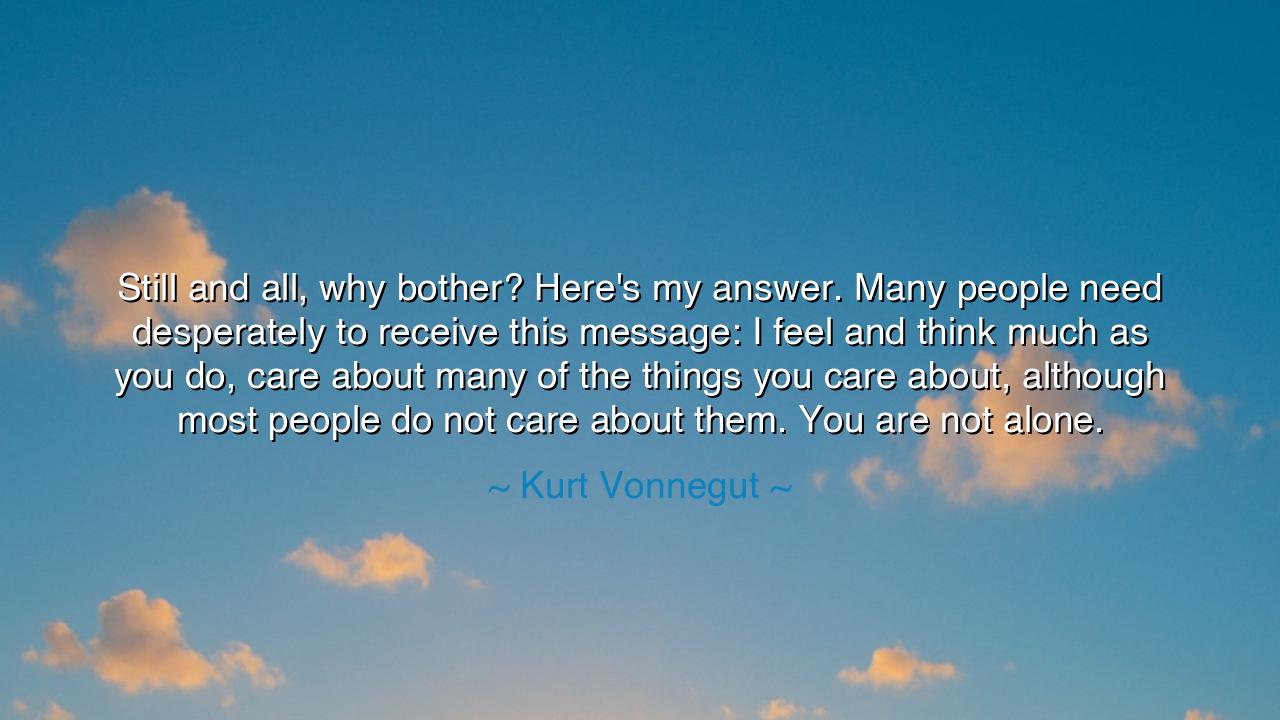
Still and all, why bother? Here's my answer. Many people need
Still and all, why bother? Here's my answer. Many people need desperately to receive this message: I feel and think much as you do, care about many of the things you care about, although most people do not care about them. You are not alone.






"Still and all, why bother? Here's my answer. Many people need desperately to receive this message: I feel and think much as you do, care about many of the things you care about, although most people do not care about them. You are not alone." These words by Kurt Vonnegut speak directly to the human condition—the quiet, often unseen struggles of the soul. Vonnegut, in his unique style, acknowledges the feelings of isolation that many of us experience. We all face moments when we feel disconnected, as though the things that matter most to us—our thoughts, emotions, and desires—are not shared by those around us. Yet, Vonnegut offers us a powerful reminder that connection is possible, that we are not alone in our experiences, even when it seems that the world is indifferent to our inner lives.
This idea of shared humanity was deeply understood by the ancients, whose philosophers often sought to connect with the essence of what it means to be human. Socrates, for example, through his dialogues, sought to draw out the commonality in human experiences. He would ask questions not to isolate or single out his followers, but to show that despite our differences, we share a common humanity. In his conversations, Socrates would demonstrate that even the most ordinary person—one who may feel alone in their experiences—shares the same capacity for reasoning, emotion, and moral reflection as any philosopher. Vonnegut, much like Socrates, points to this fundamental truth: that we are all connected, even when we think our inner struggles set us apart.
Consider the example of Marcus Aurelius, whose meditations reflect the loneliness of leadership and the weight of solitude. As the Roman emperor, he often found himself isolated, surrounded by people yet bearing the profound responsibility of guiding a vast empire. And yet, in his journals, Marcus expressed deep reflections on the shared nature of human life, recognizing that his burdens, joys, and uncertainties were not his alone. In fact, he often wrote that the difficulties he faced in his reign were part of the common human condition, and that by understanding this, he could find peace in his own heart. Marcus Aurelius found solace in the knowledge that others, too, were experiencing the same struggles—whether in leadership, love, or simply the day-to-day pursuit of meaning. His writings remind us, as Vonnegut does, that we are not alone in our experiences.
In Vonnegut’s quote, there is a powerful recognition of the human need for connection. How often do we feel misunderstood or isolated in our deepest thoughts? How often do we believe that the things that matter to us are of little consequence in the greater world? Vonnegut’s message is both a comfort and a call to action. He speaks to those who feel that their inner world is invisible, that the things they hold dear are insignificant or dismissed by the majority. In truth, this is a shared feeling. The ancients, from Epictetus to Seneca, acknowledged that every person has their own unique perspective, yet they also emphasized the universality of suffering and the importance of recognizing that our individual experiences are also part of the collective human story.
The lesson from Vonnegut’s reflection is both deeply personal and universal. He offers a profound reminder that connection is not only found in the obvious relationships of family and friends, but in the shared understanding of each other’s humanity. Even when we feel that our experiences are isolated or insignificant, there are others who understand, who feel as we feel, and who care about what we care about. You are not alone—this is the message that resonates through the ages, from the dialogues of Socrates to the meditations of Marcus Aurelius, to Vonnegut’s own words. Humanity, in all its complexity, finds its greatest strength not in solitude, but in the realization that our experiences—our joys, our struggles—are part of the fabric that connects us all.
In practical terms, this means we must open ourselves to the possibility of connection. When we feel disconnected or isolated, it is easy to retreat inwardly, to believe that our thoughts and feelings are unique to us alone. But if we allow ourselves to reach out—whether through conversation, art, or even silent understanding—we begin to see that others, too, share in our struggles and triumphs. We must allow our vulnerabilities to be visible, not as a weakness, but as a bridge to others. Just as Marcus Aurelius found peace in the understanding that others shared his burdens, we, too, can find comfort in the realization that our feelings are often shared by many.
In conclusion, Kurt Vonnegut’s quote is not only a reflection on loneliness, but a reminder of the shared human experience. We are all connected, through our struggles, our desires, and our search for meaning. As the ancients knew, wisdom comes not only from understanding oneself but from recognizing the commonality in others. The deep truth is that no one truly walks alone. We must take comfort in this, and in finding connection with others, we may begin to heal the sense of isolation that often feels overwhelming. So, let us live with the knowledge that in our humanity, we share the same struggles, the same longings, and the same capacity for growth. You are not alone, and in this, we find both strength and comfort.






AAdministratorAdministrator
Welcome, honored guests. Please leave a comment, we will respond soon